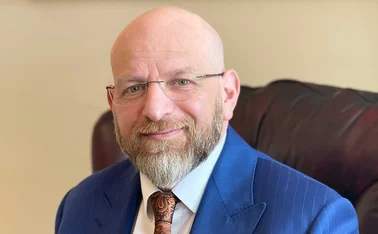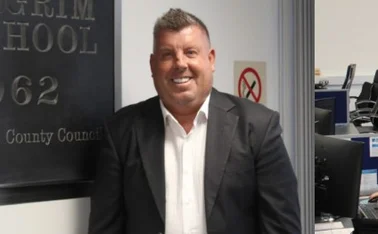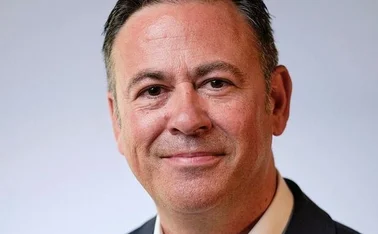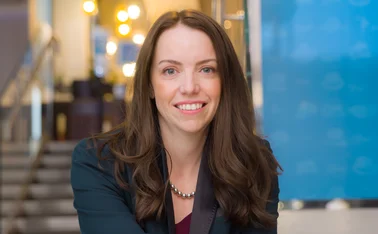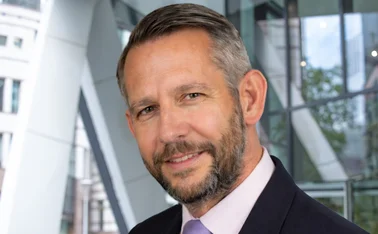
David Ross, CEO of Ardonagh Group - Taking on the world

Profile: David Ross, Ardonagh CEO, tells Insurance Age why he’s a lucky man and reveals his hopes for the group as he puts the challenges of the past five years behind him
David Ross, CEO of Ardonagh Group, is a man who is currently relieved to be out of the headlines.
He reveals to Insurance Age that he bumped into outgoing Lloyd’s performance management director Jon Hancock on the day his exit was announced, only for Hancock to joke that he was glad to have knocked him out of the press – if only for a day. But Ross is insistent he doesn’t court publicity.
Ross’s challenges since officially starting at Ardonagh in 2015 have been widely documented. He has been caught up in two major legal confrontations with former employer Gallagher, and was faced with unpicking the “ball of spaghetti” that was Towergate.
It hasn’t all been negative. He’s bought big name brokers such as Swinton and Autonet, among others, and created the Ardonagh Group. Estimates put the value of the group now at between £3.5bn and £4.0bn.
Pizza the action
It is no surprise he feels “this will probably be my last trade press profile,” but he is quick to flag that this doesn’t mean he is stepping back – merely that he wants his team to get their fair share of the limelight.
He describes Ardonagh as a pizza with each CEO having their own slice – keen to give the impression he is only part of the picture.
[The court case] was a shocking thing for our industry. Really shocking. But I don’t believe it is a reflection on the industry as a whole
The past five years have clearly been intense and at some points “awful” for the CEO but one of his most memorable moments came much earlier in his career, when he first tried to get into insurance.
At the time, Ross, who grew up in the countryside in Mullingar about 50 miles from Dublin, was considering leaving Ireland to try his luck elsewhere. He explains that young people were all emigrating but his grandparents wanted him to stay and pressured his uncle, who was CEO at Hibernian Insurance, to get him an interview.
“He set me up… with the head of HR who was one of the most unpleasant people I have ever met in my life. He abused me in rather a terrible way and told me I was useless,” Ross recalls the verbal battering.
Prior to that interview, Ross had taken a gap year in Australia and worked in construction.
“At the end, he said I should take any money I’d saved up, buy a shovel, and go back to digging. I suggested working there for free and he said he’d be over-paying me if he let that happen. I remember it like it was yesterday. It was one of the worst moments.”
That was the catalyst for him to go to the UK and get a job in the City.
“I left Ireland and ended up starting at Gallagher, full of hellfire and brimstone and wanting to take over the world.”
Ross never forgot that interview and admits that once he was established, he went back the HR director to highlight the impact his words had on his younger self: “I tore him to shreds and he complained to my uncle.”
Ross says he uses that experience to inform how he builds culture in a business.
He started at Gallagher (his first insurance role) with “lofty ambition” and said he wanted to be the youngest MD in the company’s history, only to be asked: “Main board or divisional?” Something that, at the time, stumped Ross. Despite his green-ness, he was made North American director a few years afterwards, rising to become CEO International.
Ross is proud of what he achieved at Gallagher: “I was there for 25 years and invested my heart and soul into the company.”
Despite his success, Ross felt it was time to go in 2015 as there had been a “total breakdown of trust”.
His former employer instigated legal proceedings after he left and, last year, Gallagher also lost an extremely high profile case (bar one charge around a client move) centred on staff-poaching in the Lloyd’s businesses of Gallagher and Ardonagh.
Between them, the two incidents saw Ross put under surveillance, take the stand in court, and become the centre of gossip about whether he would survive as CEO.
People should applaud the entrepreneurial behaviour being shown by those who are breaking away from conventional businesses to try and do something new
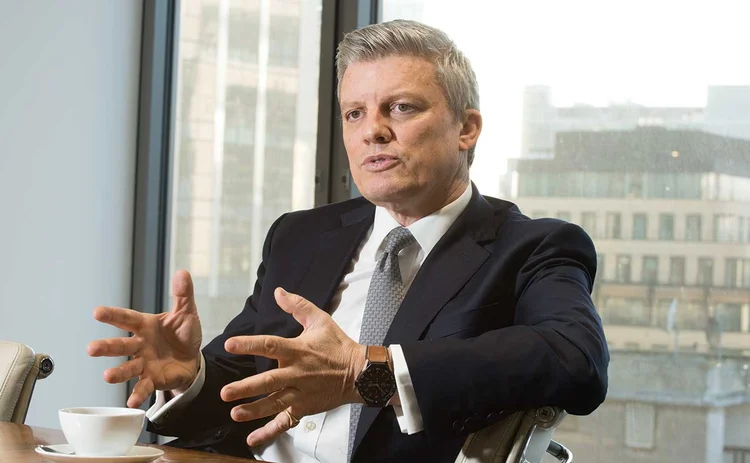
Legal actions
The first legal spat led to Towergate settling out of court for £20m after allegations of conspiracy, a team move, and accusations that Ross smashed a phone to hide evidence.
The impression of Ross angrily breaking phones is something that the market speculated about following revelations in the legal documents that he goes through a couple a year.
One of Ross’s bugbears about the industry is people “making ill-informed comments about things they know very little about” but he addresses this point in good nature, suggesting he most recently lost a phone while skiing.
Ross insists the £20m settlement was agreed so he could start fixing Towergate: “The destruction of value that was going on at Towergate was extraordinary and that was the only motivation [for the settlement]. Otherwise, we just would have waited and served out our notice.”
Smiling, he admits he was disappointed the settlement wasn’t higher but was pleased to be able to start work.
“The shrinkage at Towergate stopped the moment the cavalry arrived,” he says.
The second case revealed documents in which Gallagher UK & International CEO Simon Matson called an exiting staff member a “complicated fat Arab”. Gallagher memos also included a side order of “c*nts”, “f*ckers” and “tossers”, plus insulting references to Islam.
Even though Ardonagh came out on top – a judge dismissed the staff poaching claims (bar one client move charge) and ordered Gallagher to pay £3.1m towards Ardonagh’s costs – Ross is clearly unhappy the case ever found its way to court. According to him, other big hitters in the sector wanted to keep it behind closed doors, urging a settlement before the documents became public.
Private equity
Ross estimates that about £5bn of private equity money has come into the UK over the past five years and he doesn’t think the industry has reached saturation point yet.
He explains: “Over the last couple of years, you’ve seen, not just in insurance, a migration of public to private because there’s so much capital in the private sector and it’s incredibly difficult to run a company on a 12-week cycle.”
The catalyst for all this cash flowing into UK insurance is, he adds, thanks to the Highbridge/Towergate deal five years ago.
“If you look at the amount of private equity money that’s come into the sector in the last five years, a lot of that has been because of the progress we’ve been able to demonstrate.”
Personal
“It was a shocking thing for our industry. Really shocking. But I don’t believe it is a reflection on the industry as a whole because I think it is unique to individuals and I actually don’t believe it’s a reflection on the people in Gallagher,” Ross says.
Ross flags no pejorative language was found in the Ardonagh evidence.
The personal impact was also hard to deal with. Ross details: “I can’t even begin to tell you how awful it was actually. Not only because it was like the Eye of Sauron was basically pointed directly at me.
“It was actually having an entire organisation dragged into the most unseemly, awful fight knowing full well at the heart of it all was there just such a personal angle to the entire thing.”
Ardonagh has ploughed some of that settlement into its charitable trust.
Ross is convinced the litigation both times came down to American showmanship. “It’s about stage management and it’s about publicity and what you can make people believe,” he says.
“That is not how the British litigation system works. It’s about what you can prove.”
It also begs the question of what he would say now to his former employers at the Gallagher family who he worked with for 25 years. Ross seems at a loss and doesn’t really answer the question, instead moving to discuss the power balance between employer and employee.
Ross is quick to say that if people at Ardonagh wish to leave “you have to let them and wish them well”.
He adds much later: “[If] you’re no longer happy and your soul is just tormented and you no longer work for people you trust, you are in fact entitled to change careers, respecting your contract.”
There has clearly been more to Ross’s tenure at Ardonagh than the tussles with Gallagher. Towergate is now an integrated business and has, management say, completed its turnaround.
“We’ve finished spending more than we are making and that is still flushing through in the earnings reports.”
Prior to the bailout deal in 2015, Towergate was on the verge of collapse – “that Towergate got through the day was a miracle,” Ross says. Since then, he has led a transformation programme that has seen systems aligned to the same platforms, the closure of the much-criticised small business centre in Manchester, plus a raft of big ticket deals including Autonet, Carole Nash and Swinton.
So long as I can come to work knowing that the team around me wants me in the job and actually I’ve got the energy and enthusiasm to keep forging forward, knowing that I’ve got real support around me, I’ll just crack on

Ongoing transformation
However, the Group remains in debt and investor reports are still showing losses.
The investment report showed a loss of £67.7m for the first nine months of 2019, an increase from the £48.9m posted in 2018.
In discussions with reporters, Ross has flagged organic growth – 4.6% at the last count – and Ebitda as key performance indicators.
The most recent figures showed that income increased to £505.4m (9M 2018: £403.5m), while its adjusted Ebitda soared to £144.4m (9M 2019) from £89.5m in the first nine months of 2018.
When the Towergate bailout first took place in 2015, unsecured creditors cut the net debt by 60% to £380m and provided a £125m cash injection to the business. More debt has since been taken on to fund acquisitions such as Swinton.
How does he square the turnaround success story with that debt?
“Oh God, how do I even explain this?” he begins. He gives a £100,000 house as an example.
“Let’s say you’re earning five grand a month and your mortgage is a thousand but you’re spending 20 grand a month on your property. That is a statutory loss every single month.
“But the reality is, at the end, you have your house valued and somebody says it’s not worth £100,000, it is worth £500,000 because you’ve done all this amazing work.”
Ross is described as a visual thinker who draws everything so it’s no surprise to hear him speak in analogies like this – remember the pizza.
However, Ross doesn’t seem to have much time to relax with a pizza. When he isn’t working, he puts “every ounce” into his family. With his partner he has five children between the ages of five and 22. He lives on a farm near Tunbridge Wells with his family and his relaxation time is feeding the menagerie of animals there – cows, pigs, sheep, chickens. There are even six peacocks roaming – although he says their screeching isn’t very relaxing.
Another tension point is the ongoing rumour that Ardonagh is set for an IPO. Like any operator, Ross can’t ever rule it out completely, but he explains why going public wouldn’t be his preferred option in the near future: he values the agility of private business.
“You could never do what we’ve done in the last three years if we were public. That’s why I’m completely bewildered by people’s obsession with asking us if we’re going to go public,” he states.
“Most of the team that I work all come from the public world and would never want to go back to it.”
IPO or not, Ross clearly wants to move forward faster with Ardonagh. More acquisitions are on the table in the UK and elsewhere, which brings us around to consolidation – a Marmite topic for many.
Towergate was one of the early consolidators and its near collapse and inability to integrate is cited as an example of why the model is a failure by critics.
Buying into growth
Ross says those upset by consolidation have “got into a terrible snot about nothing” and says that to grow at scale, businesses must buy.
“People should applaud the entrepreneurial behaviour being shown by those who are breaking away from conventional businesses to try and do something new,” he argues.
He also suggests the work being done by people like Peter Blanc (Aston Lark) and Brendan McManus (PIB), alongside the private equity cash flooding in (see box), highlights the health of the UK broker space.
Ross points out that the hardening market and difficulties experienced by some carriers is creating even greater need for brokers.
“The pricing disruption is creating more need for advice from brokers because clients are basically getting caught in the crossfires of a hard market,” he explains.
His ambition is to take Ardonagh even further. In addition to deals, the group is also looking to expand into international markets.
He reveals: “The obvious place to look is the US, not as a retailer but certainly as a wholesaler or an MGA.”
He also lists Australia and Canada as potential jumping off points to build on “without ever having to learn a foreign language” but any acquisition has to fit in with Ardonagh and not be a remote outpost.
It appears Ross is in it for the long haul with Ardonagh. He comments: “So long as I can come to work knowing that the team around me wants me in the job and actually I’ve got the energy and enthusiasm to keep forging forward, knowing that I’ve got real support around me, I’ll just crack on.”
And despite the difficulties of the past five years, he thinks himself fortunate, noting that friends and colleagues stuck by him.
“I consider myself to be a very lucky man because the wisdom you get from going on that journey, it puts you into a completely different place.”
Only users who have a paid subscription or are part of a corporate subscription are able to print or copy content.
To access these options, along with all other subscription benefits, please contact info@insuranceage.co.uk or view our subscription options here: https://subscriptions.insuranceage.co.uk/subscribe
You are currently unable to print this content. Please contact info@insuranceage.co.uk to find out more.
You are currently unable to copy this content. Please contact info@insuranceage.co.uk to find out more.
Copyright Infopro Digital Limited. All rights reserved.
As outlined in our terms and conditions, https://www.infopro-digital.com/terms-and-conditions/subscriptions/ (point 2.4), printing is limited to a single copy.
If you would like to purchase additional rights please email info@insuranceage.co.uk
Copyright Infopro Digital Limited. All rights reserved.
You may share this content using our article tools. As outlined in our terms and conditions, https://www.infopro-digital.com/terms-and-conditions/subscriptions/ (clause 2.4), an Authorised User may only make one copy of the materials for their own personal use. You must also comply with the restrictions in clause 2.5.
If you would like to purchase additional rights please email info@insuranceage.co.uk

